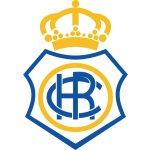| Coach | NA |
| Venue | Estadio Nuevo Colombino |
Recreativo Huelva predictions
Predictions for Recreativo Huelva: See upcoming and historic predictions for Recreativo Huelva below.
Disclaimer: Past performance does not guarantee future results. Betting involves risk; only wager what you can afford to lose. Always gamble responsibly.
Recreativo Huelva latest results
Recreativo Huelva Players
| Players | Position |
|---|---|

Ignacio Heras García
Spain
|
Attacker |
Recreativo Huelva latest transfers
| Date | Player | From | To | Price |
|---|---|---|---|---|
| 2014-08-20 | Aitor García | Recreativo Huelva | Toledo | € Free |
| 2013-08-01 | Manu Bonaque | Recreativo Huelva | Almeria | € Free |
| 2013-07-30 | José Antonio Pardo | Recreativo Huelva | Oviedo | € Free |
| 2013-07-30 | Borja Granero | Recreativo Huelva | Racing Santander | € Free |
| 2013-02-01 | A. Lamas | Recreativo Huelva | Alcorcon | € Free |
| 2008-07-23 | A. Lamas | Defensor Sporting | Recreativo Huelva | € 850K |
About Recreativo Huelva
Recreativo de Huelva, commonly known as Recre, is a Spanish football club based in Huelva, Andalusia. Founded on December 23, 1889, it holds the distinction of being the oldest football club in Spain and the 10th oldest in the world. The club's rich history and legacy have made it a significant part of Spanish football culture.
Recreativo Huelva's journey began when two Scottish doctors from the Rio Tinto Company introduced the sport to the local Spanish workers. The club was initially formed as a means of recreation for the workers, hence the name 'Recreativo'. The club's official colors, blue and white, were chosen to represent the clear skies and the Atlantic Ocean that surrounds Huelva.
The club's home ground is the Estadio Nuevo Colombino, which has a seating capacity of 21,670. The stadium is known for its vibrant atmosphere, especially during home matches, reflecting the passionate support of the Recre fans.
Recreativo Huelva has spent most of its history oscillating between the Segunda División (second division) and the lower tiers of Spanish football. The club's most successful period came in the early 2000s when they achieved promotion to La Liga, the top tier of Spanish football. Despite their struggles to maintain a consistent presence in La Liga, Recre has produced several notable players who have gone on to have successful careers both in Spain and abroad.
The club's most significant achievement to date is reaching the Copa del Rey final in 2003, where they narrowly lost to Mallorca. Despite the loss, this run is fondly remembered by the Recre faithful as it earned them a place in the UEFA Cup, marking their first and only foray into European competition.
In recent years, Recreativo Huelva has faced financial difficulties, leading to several changes in ownership. Despite these challenges, the club continues to be a vital part of the Huelva community, with a dedicated fan base and a youth academy committed to nurturing local talent.
Recreativo de Huelva's story is one of resilience and passion. From its humble beginnings as a recreational club for local workers to its highs and lows in Spanish football, Recre embodies the spirit of the beautiful game. The club's history, coupled with its commitment to community and youth development, makes it a unique and cherished institution in Spanish football.
















